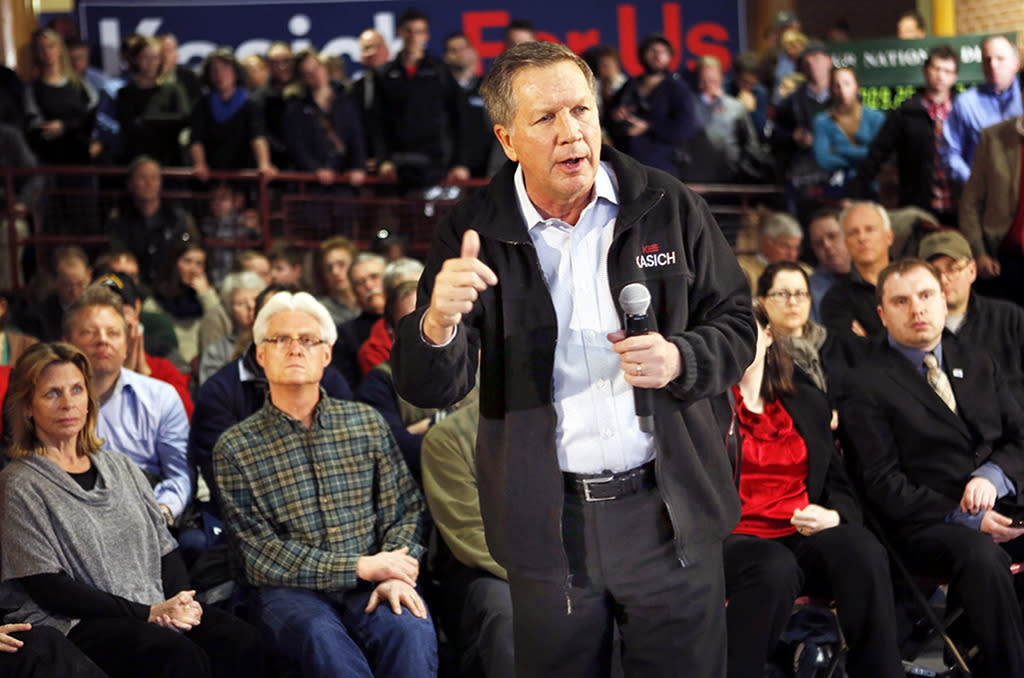One man’s lonely crusade to challenge candidates over torture

Gov. John Kasich speaks during a town hall at Concord High School in Concord, N.H., on Feb. 7, 2016. (Photo: Jim Cole/AP)
CONCORD, N.H. — They call it “primary tourism.” Every four years, out-of-state voters take to the snowy roads of New Hampshire to get a close-up look at the candidates, maybe snap a few selfies at town halls, and soak up a bit of the pageantry of a presidential election. At a Marco Rubio event on Sunday, I met three 50-something friends who’d organized a road trip to bond and indulge their passion for politics. And among the tourists, it must be said, are bosses from news organizations who want to remember what it’s like to be back on the trail — under the guise of offering support to their long-suffering political reporters.
But there are also people like Robert Griffith, a resident of Connecticut and a psychologist who is singularly focused on an issue that he believes is central to the future of American democracy: torture. Griffith was outraged by what he views as the complicity of his own profession in waterboarding and other harsh interrogation techniques used by U.S. intelligence and military operatives. In the wake of the scandal, the media and human rights organizations revealed that both the Central Intelligence Agency and the Department of Defense relied on psychologists to design their coercive interrogation programs. “It’s a perversion of the field of psychology,” Griffith said.
(The American Psychological Association, which had secretly lent its support to the harsh interrogation regime, has since stated its “unequivocal” opposition to torture. On Monday, Sen. John McCain, R-Ariz., a former prisoner of war himself, issued a statement denouncing “the loose talk on the campaign trail about reviving waterboarding and other inhumane interrogation techniques … [which] not only failed their purpose to secure actionable intelligence to prevent further attacks on the U.S. and our allies, but compromised our values, stained our national honor, and did little practical good.”)
“This is a huge deal for our country,” said Griffith, as he waited for Ohio Gov. John Kasich to appear at a town hall meeting at Concord High School. “Torture is used to suppress democracy.”
Now he has come to New Hampshire to try to force the major GOP candidates to take an unequivocal position on waterboarding. He has a question for Kasich but doesn’t know whether he’ll get the opportunity to ask it.
Slideshow: The battle for New Hampshire >>>
Some of his work was already done for him at Saturday night’s Republican debate. ABC’s David Muir began a round of questioning by asking Ted Cruz whether he believed waterboarding is torture. Cruz, who has stated unambiguously that he is against torture, walked a careful line, first asserting that the harsh technique does not meet the legal definition of torture. He then said he “would not bring it back in any widespread use.” He added that he agrees with legislation passed by the Senate last June that banned waterboarding, while acknowledging that the president, as commander in chief, has “inherent constitutional authority to keep this country safe.” Real estate mogul Donald Trump said that with ISIS “chopping the heads off of Christians,” he would bring back waterboarding “and a hell of a lot worse.” And for his part, former Florida Gov. Jeb Bush, whose brother George W. Bush authorized the technique after 9/11, said he opposed lifting the ban. “No, no I wouldn’t … where we stand is the appropriate place,” Bush said.
Kasich wasn’t drawn into that discussion.
But Griffith was ready with his question at the Concord town hall the next day.
After a freewheeling, sometimes meandering stump speech, tinged with folksy humor and emotional anecdotes about voters he’d encountered on the trail, Kasich turned to the audience for questions. Soon enough, he called on Griffith: “Yes sir, way in the back,” the candidate said, pointing.
“As a kid and attending a school like this,” Griffith began, “one of the things that made me proud to be an American was that we didn’t torture,” Griffith said. It’s an issue “that speaks to the heart and soul as to who we are as Americans.” Kasich cut Griffith off before he was able to formulate the question; he seemed to have gotten the gist of it.
Kasich began by saying Congress had addressed the issue and then pointed out that he’d served on the “defense committee” in the House of Representatives for 18 years. Then he said that Defense Secretary Donald Rumsfeld had invited him to a meeting after 9/11 where they discussed “a whole range of subjects,” before telling a jokey story about Henry Kissinger’s reaction to George Bush’s comment that he wanted Osama bin Laden “dead or alive.” Kissinger replied, Kasich recounted, imitating the former secretary of state’s deep guttural accent, “I agree. We don’t want him alive.” The audience laughed. Griffith stood in the back of the room stony-faced. Then Kasich bragged about having on his staff President Gerald Ford’s national security adviser along with the former “chief operating officer of the CIA,” whatever that is. “They all advise me,” he added.
Finally, Kasich addressed the issue. He acknowledged that torture can lead to false information, but warned that as president he could face a “Jack Bauer moment,” presumably a ticking time bomb in which the president would have to take the gloves off to save American lives. But he said he’s “comfortable where we are,” to which Griffith said, “Which is no waterboarding, right?” “Yeah, right,” Kasich answered, moving on to the next questioner.
Griffith was not satisfied with the answer. He’d wanted an unequivocal rejection of the policy. He seemed deflated and, perhaps, disappointed by the tone of Kasich’s answer, which didn’t really match the gravity of the question.
But for Griffith there was no time to linger in disappointment. He was on to the next town hall meeting.



